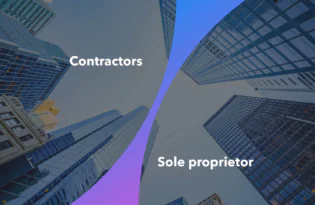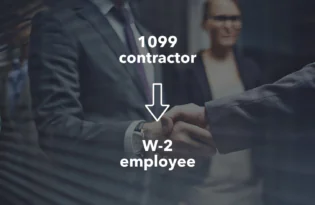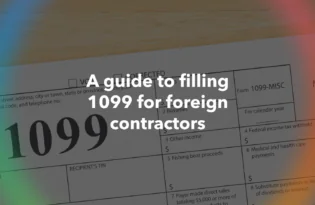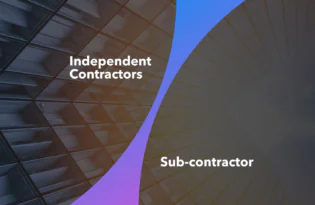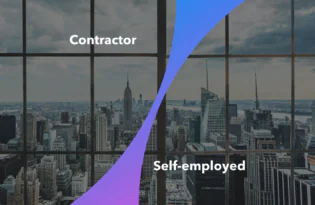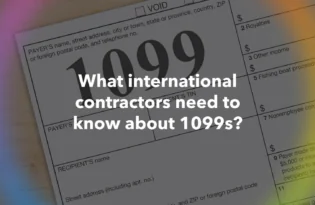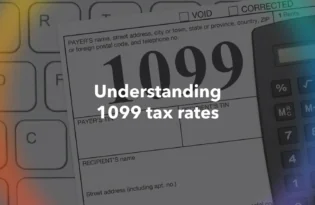How to onboard contractors
Knowing how to onboard contractors isn’t just paperwork. It sets the tone for the entire working relationship. Get it right from day one, and the rest falls into place.

Freelance work is becoming the norm across businesses and operations of all sizes, but learning how to onboard contractors effectively takes more than just handling paperwork and ticking compliance boxes.
It’s about creating a smooth, efficient process and setting the tone for a positive working relationship on both sides.
As global hiring expands alongside growing demand for freelance talent, it’s more important than ever to move beyond spreadsheets and scattered email chains. Businesses need a structured, reliable onboarding process that supports long-term success.
Below, we’ll walk through the essential steps on how to onboard contractors, along with key considerations every business should keep in mind before tapping into this flexible but complex workforce.
How to onboard contractors: A step-by-step guide
Knowing how to onboard contractors is essential because it lays the groundwork for a smooth working relationship and helps you assess whether a contractor is the right fit from the start.
A well-structured onboarding process sets clear expectations, helps you stay compliant, and positions both parties for long-term success.
| Step | What to Do | Why it Matters |
|---|---|---|
| 1. Draft a Contractor Onboarding Checklist | Create a repeatable process that outlines tasks, documents, and tools. | Enables consistency and protects institutional knowledge. |
| 2. Correctly Classify Workers | Confirm whether each hire is legally a contractor, not an employee. | Minimizes the chances of misclassification penalties and legal risk. |
| 3. Create a Clear Scope of Work (SOW) | Define deliverables, timelines, payment terms, and IP ownership. | Sets expectations and protects both parties. |
| 4. Collect Legal & Tax Documents | Gather required forms (e.g., W-9, W-8BEN) and ID verification. | Helps you stay compliant and audit-ready. |
| 5. Set Up Cross-Border Payments | Choose secure, flexible payment methods with local currency support. | Timely and seamless payments. |
| 6. Deliver a Professional Onboarding Experience | Provide tools, contacts, and communication plans. | Builds trust and gets contractors productive faster. |
| 7. Track, Communicate, and Optimize | Monitor progress, invoice status, and feedback loops. | Improves project outcomes and team collaboration. |
| 8. Stay Compliant Across Borders | Update contracts and processes to match local laws. | Protects your business as regulations change. |
1. Draft a contractor onboarding checklist
Before you hire a contractor, create a repeatable onboarding process that you can use across your team or department. This will help you reduce missed steps and common pitfalls and keep knowledge transfer between managers intact.
Action Items:
- List the key information to collect (tax, contact, and payment details)
- Document required agreements
- Prepare onboarding resources
- Establish a communication schedule and primary point of contact
- Create sub-checklists for high-priority countries with unique requirements
2. Correctly classify workers
Before anything else, you need to determine whether the new worker is an independent contractor, especially if they work remotely or in another country. Misclassification can lead to fines, tax issues, or legal penalties.
Action Items:
- Consult legal counsel or use an Employer of Record (EOR)(for employees) or Agent of Record (AOR) (for contractors).
- Document role expectations and control level
3. Create a clear Scope of Work (SOW)
A SOW is the backbone of your contractor relationship. Use a template or legal tool, get a digital signature from both parties, and be sure that it includes:
- Deliverables (specific outcomes expected)
- Timeline & milestones
- Payment terms (rate, currency, frequency)
- IP rights and ownership
- Termination clauses
4. Collect legal & tax documents
Even if the contractor is abroad, you are still responsible for compliance. Common documents include, but are not limited to:
- US Contractor: W-9, 1099-NEC
- Non-US: W-8BEN or W-8BEN-E, 1042-S
- Global: Proof of residence, national ID, VAT # (if applicable)
Action Items:
- Ask for forms before the first payment is released
- Consider using contractor onboarding software to auto-collect and store tax documents securely
5. Set up cross-border payments
Paying global contractors means dealing with multiple currencies, exchange rates, local banking regulations, and tax withholding rules. Best practices include:
- Offering payment in the contractor’s preferred currency
- Avoiding SWIFT bank wires since they’re slow and costly
- Considering the use of global payment platforms for:
- Local bank payouts
- Currency conversion at competitive FX rates
- Tax compliance automation
- Payment tracking
6. Deliver a professional onboarding experience
The working relationship is crucial to quality work, even if the contractor isn’t an employee.
Onboarding facilitates a positive dynamic between you and the contractor. Welcome emails or access to portals with important information, access to communication tools, and having an assigned point of contact can go a long way toward transparency and efficiency.
Action Items:
- Prepare an onboarding checklist
- Send credentials and expectations within the first 24–48 hours
- Treat them like a valued partner, not a transactional vendor
7. Track, communicate, and optimize
Setting clear expectations and regular feedback are critical, especially when working with contractors across time zones.
Tips:
- Set up weekly or bi-weekly check-ins
- Use shared dashboards (Trello, Asana, etc.)
- Review scope creep regularly
- Maintain a record of payments, invoices, and correspondence
Action Items:
- Create a shared doc for deliverables
- Use a contractor management platform to handle invoices, status, and payment logs
8. Stay compliant globally
As laws evolve, especially for global contractors, your compliance strategy needs to be proactive and malleable.
Consider using a platform with integrated compliance tools, such as:
- KYC verification
- Contractor classification reviews
- Tracking where your contractors live and work (since some laws are location-specific, not citizenship-based)
What if you didn’t need multiple tools to onboard contractors?
Running contractor onboarding in-house can be a real headache, no matter the size of your organization. You’ll need internal systems for contracts, invoicing, and payments before worrying about compliance, classification, and navigating regional tax and payroll regulations.
That’s where a robust platform like Payoneer Workforce Management comes in. It offers employers of all sizes a one-stop platform that simplifies contractor onboarding and engagement.
| What You Get | What it Does | How it Helps |
|---|---|---|
| Unified Toolsets; No Piecemeal Solutions | Onboarding across 160+ countries, with compliant contractor agreements, multi-currency payments. | Cuts down on busywork. You get contracts, invoicing, and expense tracking all in one clean, centralized dashboard. |
| Support for Freelancers/ Contractors and Remote Full-Timers | Handles both freelancers/ contractors (AOR) and full-time remote employees (EOR). Offers hourly and milestone invoicing, paid in 70+ currencies. | Whether hiring one freelancer/contractor or scaling a global team, payments are timely. |
| Trust & Scale | Mitigate misclassification risks, localized contractor agreements. | Supports smooth operations. |
| Mobile Onboarding & Management | With the Payoneer Workforce Management app, contractors can invoice, track hours, submit expenses, and get support all from their phones. | Keeps everyone moving. Your team can handle issues on the fly without waiting around or chasing paperwork. |
Start onboarding contractors confidently with Payoneer Workforce Management
Knowing how to onboard contractors is just the beginning. As your business scales and your workforce becomes more global, onboarding can quickly become complex. Juggling legal requirements, cross-border payments, and onboarding logistics, especially across multiple jurisdictions, can create unnecessary friction and risk.
That’s where Payoneer Workforce Management comes in. Built with a global employment infrastructure, our unified platform helps streamline contractor onboarding.
- Comprehensive contractor Onboarding
- Worker classification support
- Localized independent contractor agreements
- Cross-Border Payments
- Centralized Contractor Management Dashboard
We do the heavy lifting for you so you can focus on delivering exceptional service to your clients.
Whether you’re hiring one freelancer or building a global contractor team, Payoneer Workforce Management makes it easy to onboard, pay, and manage talent across 160+ countries.
If you’re ready to take charge of your workforce, reach out today for a free demo.
Related resources
Latest articles
-
Employment laws in Sweden
Explore the employment laws in Sweden, a comprehensive guide to employees’ rights, employer obligations, and fair labor practices.
-
Employment laws in Poland
Explore the ins and outs of employment laws in Poland, an info-rich guide to employees’ rights, employer obligations, and fair labor practices that shape the future.
-
Employment laws in Indonesia
Find out more about Indonesia labor laws that dictate how employees should be contracted, managed, and paid, both on a national and state/territory level.
-
Employment laws in France
Learn about France’s labor laws dictating minimum wage, benefits, and more. Plus, discover the consequences of non-compliance with employment laws in France.
-
Employment laws in Spain
Find out more about Spain’s labor laws, from contracts and benefits to termination rules.
-
Employment laws in Australia
Find out more about the employment laws in Australia that dictate how employees should be contracted, managed, and paid, both on a national and state/territory level.
Disclaimer
The information in this article/on this page is intended for marketing and informational purposes only and does not constitute legal, financial, tax, or professional advice in any context. Payoneer and Payoneer Workforce Management are not liable for the accuracy, completeness or reliability of the information provided herein. Any opinions expressed are those of the individual author and may not reflect the views of Payoneer or Payoneer Workforce Management. All representations and warranties regarding the information presented are disclaimed. The information in this article/on this page reflects the details available at the time of publication. For the most up-to-date information, please consult a Payoneer and/or Payoneer Workforce Management representative or account executive.
Availability of cards and other products is subject to customer’s eligibility. Not all products are available in all jurisdictions in the same manner. Nothing herein should be understood as solicitation outside the jurisdiction where Payoneer Inc. or its affiliates is licensed to engage in payment services, unless permitted by applicable laws. Depending on or your eligibility, you may be offered the Corporate Purchasing Mastercard, issued by First Century Bank, N.A., under a license by Mastercard® and provided to you by Payoneer Inc., or the Payoneer Business Premium Debit Mastercard®, issued and provided from Ireland by Payoneer Europe Limited under a license by Mastercard®.
Skuad Pte Limited (a Payoneer group company) and its affiliates & subsidiaries provide EoR, AoR, and contractor management services.

